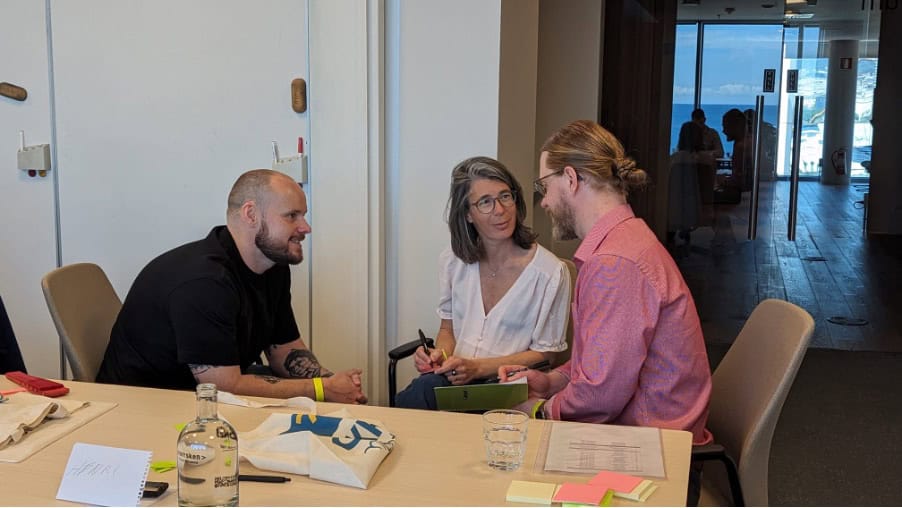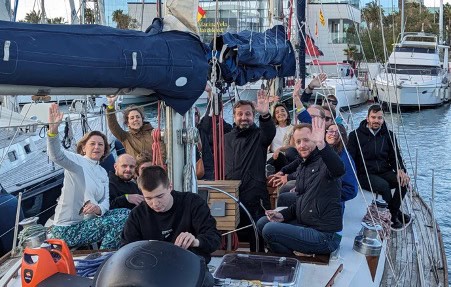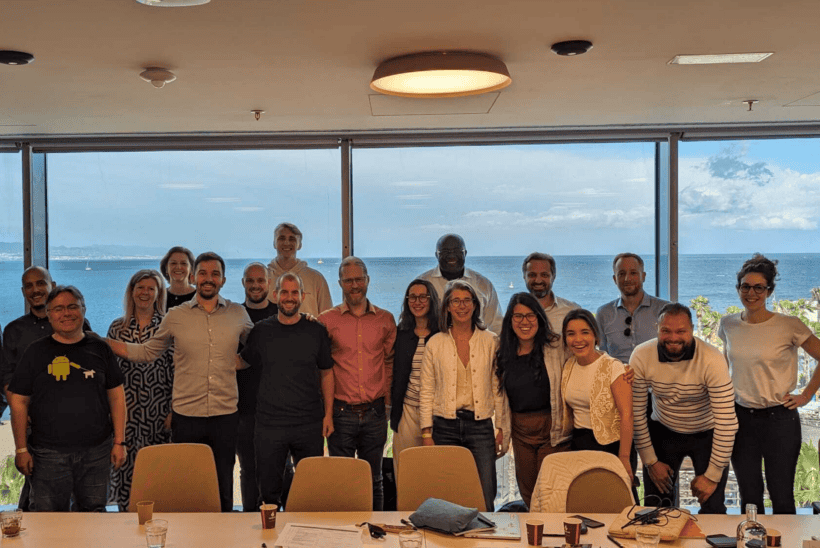McKenna Agile Consultants have recently joined the OKR Mentors Collective – a group of diverse, thought leaders and experts in using, creating, and deploying OKRs (Objectives and Key Results) in organisations worldwide. At the beginning of May, the collective members gathered in Barcelona, Spain, to spend some time diving into the field of strategy, execution and OKRs. This blog covers some of our key takeaways from the event.

It’s not about rewriting strategy, it’s about making it more “connectable”
As OKR coaches we often see challenging conversations with leaders when working with them on their strategy to inform the OKRs. We discussed how to ensure that we are not dismissing or rewriting a strategy ourselves. Our role is to not recreate your strategy for you but to make it more connectable for your people and teams. This may mean breaking it down into clearer, more concise language to make it clear how the OKRs that we will eventually create will connect.
To do this, we use 1-to-1 coaching sessions with the person responsible for the strategy (usually the CEO or similar) and tools like the Strategy Choice Cascade from Playing to Win.
The clearer the strategy, the easier it is to create OKRs.
Learn more about OKRs and their importance to organisations here.
Key Result Owners or Key Result Drivers?
Many of our clients say they didn’t realise how much “words matter” when creating great OKRs. In the same vein, we were discussing some of the common OKR roles that we have used, from OKR Champions to OKR Owners and Key Result (KR) Owners.
Some of the collective members have experienced some resistance around the word “Owner” due to negative connotations, with it being misunderstood as having full ownership over the OKR, or the KR. To overcome this, the role could be renamed to OKR Driver, or KR Driver. The word “driver” suggests more of a directional, facilitation and guidance role, as opposed to being ultimately responsible. As OKRs require a high level of collaboration to successfully execute, “Driver” can help to ensure that the whole team feels accountable for the success of the OKR.
The renaming of roles could also be applied to agile teams in the context of a Product Owner. In a large organisation, the Product Owner rarely “owns” all decisions regarding the product. So, in some contexts, Product Driver could be an appropriate alternative.

Understanding new ways to handle KRs for more traditional “brick and mortar” organisations
A lot of OKR success stories are based on companies who are creating a digital solution, like an app, SaaS or a website. These companies often already have an optimized agile execution engine and can make small changes that result in fast feedback.
In addition to implementing OKRs with digital companies, McKenna Agile Consultants has recently been working with manufacturing companies that build physical products like large vehicles and commercial electronics, who have much larger feedback cycles than their digital counterparts.
We raised this topic to discuss with the experts and aligned our approach with some other ideas and insights with the group, such as:
- Breaking down milestones into outcomes – what does this milestone give us? How can we test the milestone? Could this form a Key Result? How can you make it measurable?
- Being flexible with inputs, outputs and outcomes – In these larger cycles, as the OKRs cascade to the teams, the teams often become further removed from the customer outcomes. In these scenarios it is OK to be flexible with the Key Results, providing that they remain measurable.
- Use OKRs as an opportunity to drive improvements in how you build things – is this a chance to adopt a leaner, more agile approach?
Try our AI-powered strategy and OKR assessment tool to self-assess your strategy and OKR maturity.
How can you gamify an OKR implementation?
Let’s face it – OKRs are simple to understand but incredibly hard to master. The process of creating OKRs is a difficult thing to do, not to mention the amount of feedback that they generate. OKRs don’t have to be so serious – you can introduce some fun too! We shared some of the games and techniques that we have used throughout OKR implementations.
One of our favorites is a chair game that we use to break down silos and emphasis collaboration – key ingredients for successful OKRs. Get in touch if you’d like to hear all about it.

How do you understand your OKR maturity? Is it even important?
Organisations are obsessed with maturity. Whether it is agile maturity, skills maturity or governance maturity, there is a tool to reassure you that you’re doing great, or to tell you that you need some help.
Naturally, our clients are asking the same questions about OKRs: “How good are we at OKRs?” We have created our own AI Powered Strategy and OKR Assessment tool to help you understand this.
When we implement OKRs or Agile in organisations, we often encourage a “Crawl, Walk, Run, Fly” approach, incrementally in small chunks iterating to a more established model that works for you. Our opinion is that the best and most accurate way of assessing your OKRs is by answering the following question: “Are we consistently meeting our OKR outcomes, leading to significant transformation?”
Building a powerful network of like-minded, creative, inspirational and outcome-focused OKR experts from around the world!

The OKR Mentors Collective is a powerhouse of world-class OKR experts. When we are consulting on an OKR deployment, we are often the lone expert, which at times can make it difficult to test ideas, brainstorm and problem-solve. With McKenna Agile Consultants now a part of the largest OKR expert community in the world, we can leverage our connections to help us learn, grow and expand as and when we need it with our clients.
Not only that, but we also had a lot of fun along the way and we’re already excited for the 2025 gathering!
Try our free OKR assessment tool for yourself and get in touch to discuss your results.


